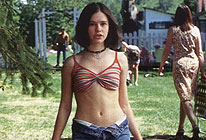|
|
|
|
A
Walk on the Moon
|
 |
|
There is a small genre of American films about families on summer holiday at country resorts (usually in the Catskills) – Dirty Dancing (1987) being the most famous. All these films seem to have the same basic subject: they are all about a dream of escape from the drudgery of a settled life – and about facing the consequences of acting on that dream. In A Walk on the Moon, Pearl (Diane Lane) is a dissatisfied housewife who can faintly hear the siren call of the 1960s lifestyle revolution. Just as her daughter, Alison (Anna Paquin), is awakening to her own sexuality, Pearl finds herself drawn to an easy-going, "liberated" stranger, Walker (Viggo Mortensen). But Pearl has not only her two children and her frequently absent husband, Marty (Liev Schreiber), to contend with, but also his canny mother, and indeed an entire community of families who have made this ritual journey to the Catskills. A Walk on the Moon, the directorial debut for actor Tony Goldwyn, is a haunting and often moving drama. Its best scenes do full justice to the sad, passionate, searching songs on its soundtrack, like Janis Joplin's rendition of the Heyward-Gershwin standard "Summertime". When it avoids cliché and undercuts expectations, when it is still, quiet and intimate, the film achieves a soulful, probing mood akin to overlooked gems like Robert Mulligan's The Man in the Moon (1993) and Diane Keaton's Wildflower (1994). Like those directors, Goldwyn employs a style that is largely "invisible". Unfortunately, the film cannot sustain its fresh tone. Phony or false notes increasingly intrude as it tries to resolve its painful, perplexing issues (a Woodstock interlude is so oddly condensed it resembles a dream sequence). And a certain formulaic approach takes over, indicating a slightly anxious pitch to the "chick flick" niche market. The women are more certainly drawn than the men. Schreiber conveys well the hurt and puzzlement of Marty, but his voyage to a little self-knowledge is given in corny shorthand – as opposed to how the camera lingers on the faces and slowly changing moods of Pearl and Alison. This bias is both the limit and the charm of the film. Mortensen incarnates a pure fantasy figure. Living solely for the present moment and the thrill of love, Walker demands nothing of Pearl. He is the handsome, soulful drifter eulogised in a dozen Joni Mitchell songs, apparently incapable of a single base, selfish or manipulative emotion – a Mills and Boon hero for the Woodstock generation. © Adrian Martin October 1999 |
![]()